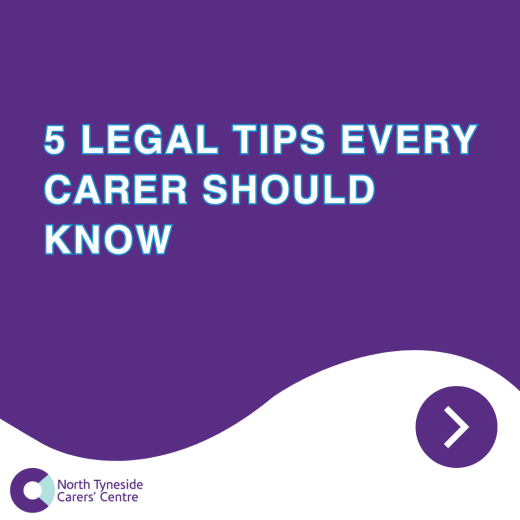The legal stuff – how to deal with the big decisions
Aaron Raper-Smith, Benefits & Legal Advisor at North Tyneside Carers’ Centre shares some insights on the big legal decisions many carers encounter.
If you care for someone you will often have to make big decisions about their wellbeing, finances and health.
Questions can arise like what happens when the person you care for can no longer make key decisions for themselves? Who makes sure their needs are met?
This is where a Lasting Power of Attorney (LPA) becomes essential. An LPA legally designates someone – usually a trusted family member or friend – to act on behalf of an individual in critical matters. This gives the person being cared for more control over what happens to them if they have an accident or an illness and cannot make their own decisions,
Without this document in place, families can face legal obstacles, delays, and uncertainty during already difficult times.
In this blog, I will set out five tips that will help you as a carer to feel confident about your rights and responsibilities and get to know the legal side that will help you make decisions.
The main thing I want to get across is that you have the power to make informed, compassionate decisions for those you care for most.
Tip 1: Utilise free resources – Law firms and solicitors can be expensive and daunting, but they don’t need to be the answer to every legal concern or query. A competent free Legal Advisor can provide information and guidance on a wide range of legal topics and they can be found at law centres and charities, you don’t need to face anything alone.
Tip 2: Avoid future headaches – Unexpectedly having to handle someone’s finances or healthcare decisions can be one of the most stressful situations a carer can be put into, this is especially true if no provisions have been put into place. As set out above, by applying for a Lasting Power of Attorney, the stress of this process can be significantly reduced and can allow you more time and energy to focus on yourself, and your loved one.
Tip 3: Know your rights – Knowing your rights can be the difference between staying employed while being a carer, and feeling that you have no choice but to leave, or the difference between receiving further support or not. Your rights include the freedom to live free from indirect discrimination due to your caring role, to have a carer’s assessment and to receive support if you’re struggling.
Tip 4: Make work ‘work’ for you – Being a carer is difficult, but doing this alongside employment can take its toll. Utilise your employment rights to make your situation as simple as possible. You have a right to request flexible working to fit around your caring role, a right to carer’s leave and a right to reasonable adjustments; all of these can be utilised to support you to stay in employment as a carer. For more detail, read our blog on rights in the workplace.
Tip 5: Check what you’re entitled to – The vast majority of carers have access to public funds, meaning that you are able to claim benefits if you meet their individual eligibility criteria. Arranging an appointment with a Benefits Advisor will allow you to see if you’re eligible to claim Carer’s Allowance, Carer’s Credit or an additional Carer’s Element to your Universal Credit, which can be a great financial boost. If you would like to know more read our blog here.
Getting to know and understand the legal aspects of caring for someone can feel overwhelming, but taking proactive steps can make a world of difference—for you and the person you care for. By understanding key tools like the Lasting Power of Attorney, accessing available benefits, and staying informed about your legal responsibilities, you’ll be better equipped to handle issues that may come up in the future. You are not alone on this journey; support and guidance are available from North Tyneside Carers’ Centre – feel free to get in touch.

